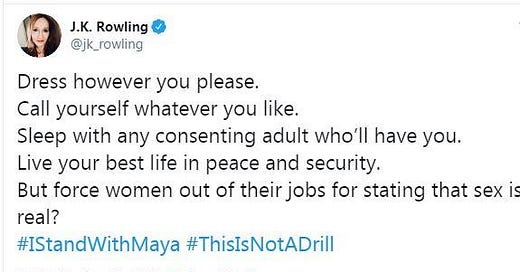We believe gender is real
Per Ivan Illich, we believe that gender is real: it is the instantiation of sex in culture. This does not make gender good or bad: it just is. There is no society on Earth, past or present, that did or does not instantiate the biological reality of sexual dimorphism into its culture. We also believe that the spheres of subsistence that gender has traditionally demarcated are still meaningful and valuable in a society that too often tends to dismiss gender as oppression, stereotypes, and general backwardness.
The fight against the word ‘gender’
Nowhere is this dismissal more irritating (to George) than in the “gender-critical” world. (First order of business: we need a different word!) In their zeal to debunk and remove from law the religious claim of an individual’s “gender identity,” they are discarding the word gender as if it were the problem, rather than delusional people thinking sex change is possible and demanding the rest of us go along with it (and pay for their self-harm).
The comments on George’s call to Kellie-Jay Keen, who wasn’t convinced (George wasn’t at her most eloquent, though that might not have helped), are revelatory on this front.
First, here’s the call (George rings in at 16:23; timestamped YouTube links don’t auto-embed in Substack, sigh). KJK is always gracious, which George appreciates (and doesn’t adore her any less for being — so far! — unconvinced).
And here are a few knee-jerk responses (from the live chat):
Nonsense word and useless
Thank you Posie Parker, for not needing the tra word, I’m completely with you.
I think that gender is derived from the concept of gender roles, which is in turn was based on stereotypes, biological determinism.
This dismissal of gender as the bullshit belonging to the other side seems to be a theme.
While Billboard Chris clearly means “gender identities” when he says “genders,” he is in effect throwing the baby out with the bathwater, as there are certainly two “genders” — even if they are not personal, but rather cultural, corresponding to the two human sexes.
The ignorance of the history of gender (indeed, that it was so powerful as to influence many of the world’s languages, including Old English) isn’t limited to random activists fighting cross-sex fantasy. Even a well-educated psychiatrist seems to think that the history of gender begins with the disturbed, abusive John Money (start at 6:40):
Exploring gender in its proper sense
This episode is dedicated to an exploration of gender — the cultural meaning of sex — free of the current predicament that demands that we throw the baby out with the bathwater.
We will read Norah Vincent’s fascinating Self-Made Man: One Woman’s Journey into Manhood and Back Again, a book published in 2006 that reads from a bygone era — an era before the doctrine of “trans” was everywhere. Norah isn’t confused about her “gender identity”:
Am I a transsexual or a transvestite, and did I write this book as a means of coming out as such?
The answer to both parts of that question is no.
I say this with the benefit of experimental hindsight, because after having lived as a man on and off for a year and a half, if I were either a transsexual or a true lifestyle transvestite, I can assure you that I would know it by now.
For one thing, I would have experienced far more satisfaction living as Ned…
I rarely enjoyed and never felt in any way fulfilled personally by being perceived and treated as a man. I have never, as many transsexuals assert, felt myself to be a man trapped in the wrong body. On the contrary, I identify deeply with both my femaleness and my femininity, such as it is, more so after Ned, in fact, than ever before. (15-16)
Because she is a woman, a lesbian, and a thoughtful writer, Norah’s experiment provides a fruitful entry point to a more nuanced discussion of what gender actually is: cultural, not personal; negotiated in society, not merely declared by every individual as an identity characteristic.
It’s not about you: gender is always about us.
It was hard being a guy… I didn’t like how wooden I felt and had to make myself in order to pass as a believable guy. I had to do a lot of crossing out when I crossed from woman to man. I hadn’t anticipated this when I’d started as Ned. I had thought that by being a guy I would get to do all the things I didn’t get to do as a woman, things I’d always envied about boyhood when I was a child: the perceived freedoms of being unafraid in the word, stamping around loudly with my legs apart. But when it actually came to the business of being Ned I rarely felt free at all. Far from busting loose, I found myself clamping down instead.
I curtailed everything: my laugh, my word choice, my gestures, my expressions. Spontaneity went out the window, replaced by terseness, dissimulation and control. I hardened and denied to the point almost of ossification.
I couldn’t be myself, and after a while, this really got me down. I spent so much time worrying about being found out, even after I knew that nobody would question the drag, that I began to feel as stiff and scripted as a sandwich board. And it wasn’t being found out as a woman that I was really worried about. It was being found out as less than a real man, and I suspect this is something a lot of men endure their whole lives, this constant scrutiny and self-scrutiny.
Someone is always evaluating your manhood. Whether it’s other men, other women, even children. And everybody is always on the lookout for your weakness or your inadequacy, as if it’s some kind of plague they’re terrified of catching, or, more importantly, of other men catching. If you don’t make the right move, put your eyes in the right place at any given moment, in the eyes of the culture at large that threatens the whole structure. Consequently, somebody has always got to be there kicking you under the table, redirecting, making or keeping you a real man.
And that, I learned very quickly, is the straightjacket of the male role, and one that is no less constrictive than its feminine counterpart. You’re not allowed to be a complete human being. Instead you get to be a coached jumble of stoic poses. You get to be what’s expected of you. (275-76)







